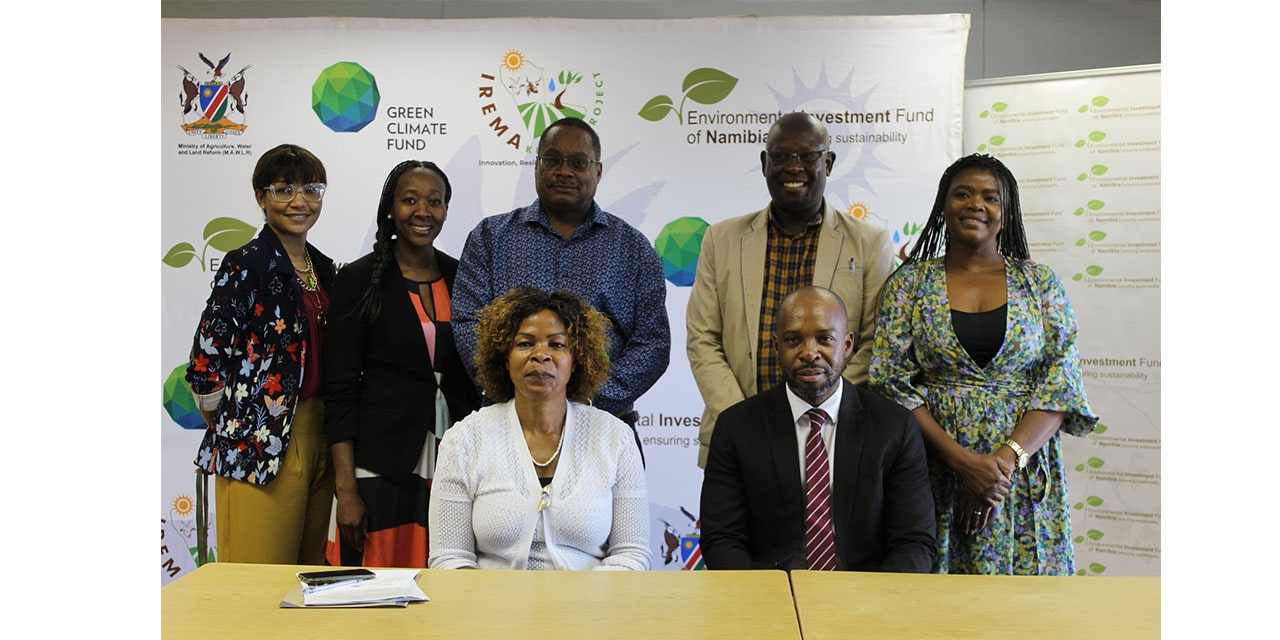Martin Endjala
The Environmental Investment Fund and the Ministry of Works has signed a Memorandum of Understanding to fight climate change in the Kunene Region.
Kunene is one of the most vulnerable regions in the country that is severely affected by climate related shocks, particularly the prolonged devastating droughts that have culminated in the loss of people’s livelihoods as a result of high livestock mortality.
The Chief Executive officer of Environmental Investment Fund of Namibia Benedict Libanda said during the announcement of the MoU today that an early warning system will prepare the authorities to come up with early interventions to safeguard lives and livelihoods and to support people in a dignified way.
Libanda stated that it is extremely important to convert the MOU from a commitment on paper
to reality, to make meaningful impact in the lives of the people.
The initiative is an adaptive measure, aimed at climate change, by using integrated communication systems to help communities prepare themselves for hazardous climate-related events.
“A successful Early Warning System (EWS) saves lives, ecosystem and infrastructures and supports long-term sustainability,’’ Libanda emphasized.
The system, he continued, further assist in planning, saves money and protecting the economy against sudden shocks.
EIF has been funded with USD$ 10 million by the Green Climate Fund (GCF) under the Ministry of Environment, Forestry and Tourism.
The fund is spear-headed by the Improving Rangeland and Ecosystem Management (IREMA) project which is implemented in conjunction with the Ministry of Agriculture, Water and Land Reform.
An Early Warning System has been developed that is tailored for Kunene region that will cost N$950 000, which is still busy being finalised.
Moreover, through its partnership with MTC, four automated weather station have been procured at a cost of N$800 000. Anchor project areas to benefit from the installations are Warmquelle, Fransfontein, Kamanjab and Bergseg in the Kunene Region.
Libanda pointed out that the mobilization of more resources and prioritized investments in adaptation and early warning cannot be overemphasized, adding that the initiative will help in making informed decisions, lead to increased availability and access to early warning information.
Disaster risk information and assessment to people and access to multi-hazard data, will be
substantially increased by 2030, Libanda said, calling on more partnerships to come on board to make inputs.
The project has assisted over 1000 farmers with livestock donations, during the prolonged drought and still continues helping the communities.
The EIF chief operations officer Karl Aribeb, explained that the Kunene region is not the only region to benefit, but Hardap region too, as well as the Khorixas area.
The Executive Director of the Ministry of Works, Esther Kaapanda stressed that the noble initiative, will help farmers to better equip themselves with adaptive resilience measures on how to respond to climate change.
“We cannot fight nature, but we can learn how the ecosystem operates, and learn to adapt to its constant changing,’’ Kaapanda stated.
She further pointed out that devastating climate changes, at times leaves communities’ livelihoods in a detrimental state.
Informed weather forecasts, early warnings, and the manual and automatic geological equipment, are essential in climate change in the Kunene Region and the entire country, Kaapanda added. Additionally, the ability to forecast the weather, prepare and safeguard their properties and to assist during the eventuality in terms of threatening situations are necessary tools that they will be equipped with.
“If you treat the ecosystem with integrity, it will treat you the same,” Kaapanda sounded.
The Deputy Director of the Namibia Metrological Services Franz Uirab, stated “if you treat the atmosphere and the nature as it is supposed to be treated, it will in return treat you in a similar fashion”.
Uirab emphasized that the initiative put in place, will help the centre to collect valuable data that can be studied upon, to help better understand how the weather patterns in the regions are behaving.
The system will enable them to make effective actions in finding amicable solutions to the Kunene’s climate vulnerabilities and kind of infrastructure and green schemes needed in such climate conditions.
Aribeb, concluded with the saying that, “a journey of 100 miles, starts with small steps”, noting that the noble initiative is a resilience measure in adapting to the climate changes.




